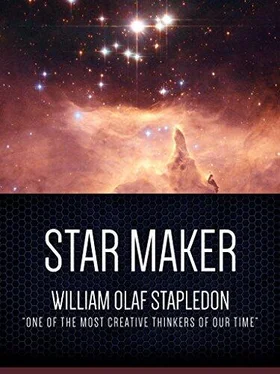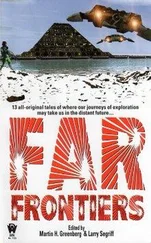We noted that the new world-orders were very diverse. This was, of course, to be expected, since biologically, psychologically, culturally, these worlds were very different. The perfected world-order of an Echinoderm race had of course to be different from that of the symbiotic Ichthyoids and Arachnoids; and this from that of a Nautiloid world, and so on. But we noted also in all these victorious worlds a remarkable identity. For instance, in the loosest possible sense, all were communistic; for in all of them the means of production were communally owned, and no individual could control the labor of others for private profit. Again, in a sense all these world-orders were democratic, since the final sanction of policy was world-opinion. But in many cases there was no democratic machinery, no legal channel for the expression of world-opinion. Instead, a highly specialized bureaucracy, or even a world-dictator, might carry out the business of organizing the world's activity with legally absolute power, but under constant supervision by popular will expressed through the radio. We were amazed to find that in a truly awakened world even a dictatorship could be in essence democratic. We observed with incredulity situations in which the "absolute" world-government, faced with some exceptionally momentous and doubtful matter of policy, had made urgent appeals for a formal democratic decision, only to receive from all regions the reply, "We cannot advise. You must decide as your professional experience suggests. We will abide by your decision."
Law in these worlds was based on a very remarkable kind of sanction which could not conceivably work successfully on Earth. There was never any attempt to enforce the law by violence, save against dangerous lunatics, such as sometimes occurred as throw-backs to an earlier age. In some worlds there was a complex body of "laws" regulating the economic and social life of groups, and even the private affairs of individuals. It seemed to us at first that freedom had vanished from such worlds. But later we discovered that the whole intricate system was regarded as we should regard the rules of a game or the canons of an art, or the innumerable extra-legal customs of any long-established society. In the main, everyone kept the law because he had faith in its social value as a guide to conduct. But if ever the law seemed inadequate he would without hesitation break it. His conduct might cause offense or inconvenience or even serious hardship to his neighbors. They would probably protest vigorously. But there was never question of compulsion. If those concerned failed to persuade him that his behavior was socially harmful, his case might be tried by a sort of court of arbitration, backed by the prestige of the world-government. If the decision went against the defendant, and yet he persisted in his illegal behavior, none would restrain him. But such was the power of public censure and social ostracism that disregard of the court's decision was very rare. The terrible sense of isolation acted on the law-breaker like an ordeal by fire. If his motive was at bottom base, he would sooner or later collapse. But if his case had merely been misjudged, or if his conduct sprang from an intuition of value beyond the range of his fellows, he might persist in his course till he had won over the public.
I mention these social curiosities only to give some illustration of the far-reaching difference between the spirit of these Utopian worlds and the spirit which is familiar to readers of this book. It may be easily imagined that in our wanderings we came upon a wonderful diversity of customs and institutions, but I must not pause to describe even the most remarkable of them. I must be content to outline the activities of the typical waking worlds, so as to be able to press on to tell a story not merely of particular worlds but of our galaxy as a whole. When a waking world had passed through the phase of radical social reconstruction, and had attained a new equilibrium, it would settle into a period of steady economic and cultural advancement. Mechanism, formerly a tyrant over body and mind, but now a faithful servant, would secure for every individual a fullness and diversity of life far beyond anything known on earth. Radio communication and rocket travel would afford to each mind intimate knowledge of every people. Labor-saving machinery would reduce the work of maintaining civilization; all mind-crippling drudgery would vanish, and the best energy of every one of the world-citizens would be freely devoted to social service that was not unworthy of a well-grown intelligent being. And "social service" was apt to be interpreted very broadly. It seemed to permit many lives to be given over wholly to freakish and irresponsible self-expression. The community could well afford a vast amount of such wastage for the sake of the few invaluable jewels of originality which occasionally emerged from it.
This stable and prosperous phase of the waking worlds, which we came to call the Utopian phase, was probably the happiest of all the ages in the life of any world. Tragedy of one sort or another there would still be, but never widespread and futile distress. We remarked, moreover, that, whereas in former ages tragedy had been commonly thought of in terms of physical pain and premature death, now it was conceived more readily as resulting from the clash and mutual yearning and mutual incompatibility of diverse personalities; so rare had the cruder kind of disaster become, and on the other hand so much more subtle and sensitive were the contacts between persons. Widespread physical tragedy, the suffering and annihilation of whole populations, such as we experience in war and plague, were quite unknown, save in those rare cases when a whole race was destroyed by astronomical accident, whether through loss of atmosphere or the bursting of its planet or the plunging of its solar system into some tract of gas or dust.
In this happy phase, then, which might last for a few centuries or for many thousands of years, the whole energy of the world would be devoted to perfecting the world-community and raising the caliber of the race by cultural and by eugeni-cal means.
Of the eugenical enterprise of these worlds I shall report little, because much of it would be unintelligible without a minute knowledge of the biological and biochemical nature of each of these non-human world-populations. It is enough to say that the first task of the eugenists was to prevent the perpetuation of inheritable disease and malformation of body and mind. In days before the great psychological change even this modest work had often led to serious abuses. Governments would attempt to breed out all those characters, such as independence of mind, which were distasteful to governments. Ignorant enthusiasts would advocate ruthless and misguided interference in the choice of mates. But in the more enlightened age these dangers were recognized and avoided. Even so, the eugenical venture did often lead to disaster. One splendid race of intelligent avians we saw reduced to the sub-human level by an attempt to extirpate susceptibility to a virulent mental disease. The liability to this disease happened to be genetically linked in an indirect manner with the possibility of normal brain development in the fifth generation. Of positive eugenical enterprises I need only mention improvements of sensory range and acuity (chiefly in sight and touch), the invention of new senses, improvements in memory, in general intelligence, in temporal discrimination. These races came to distinguish ever more minute periods of duration, and at the same time to extend their temporal grasp so as to apprehend ever longer periods as "now."
Many of the worlds at first devoted much energy to this kind of eugenical work, but later decided that, though it might afford them some new richness of experience, it must be postponed for the sake of more important matters. For instance, with the increasing complexity of life it soon appeared very necessary to retard the maturing of the individual mind, so as to enable it to assimilate its early experience' more thoroughly. "Before life begins," it was said, "there should be a lifetime of childhood." At the same time efforts were made to prolong maturity to three or four times its normal extent, and to reduce senility. In every world that had gained full eugenical power there arose sooner or later a sharp public discussion as to the most suitable length of individual life. All were agreed that life must be prolonged; but, while one party wished to multiply it only three or four times, another insisted that nothing less than a hundred times the normal life-span could afford the race that continuity and depth of experience which all saw to be desirable. Another party even advocated deathlessness, and a permanent race of never-aging immortals. It was argued that the obvious danger of mental rigidity, and the cessation of all advancement, might be avoided by contriving that the permanent physiological state of the deathless population should be one of very early maturity.
Читать дальше









![Олаф Стэплдон - Создатель звезд [сборник litres]](/books/433148/olaf-stepldon-sozdatel-zvezd-sbornik-litres-thumb.webp)


